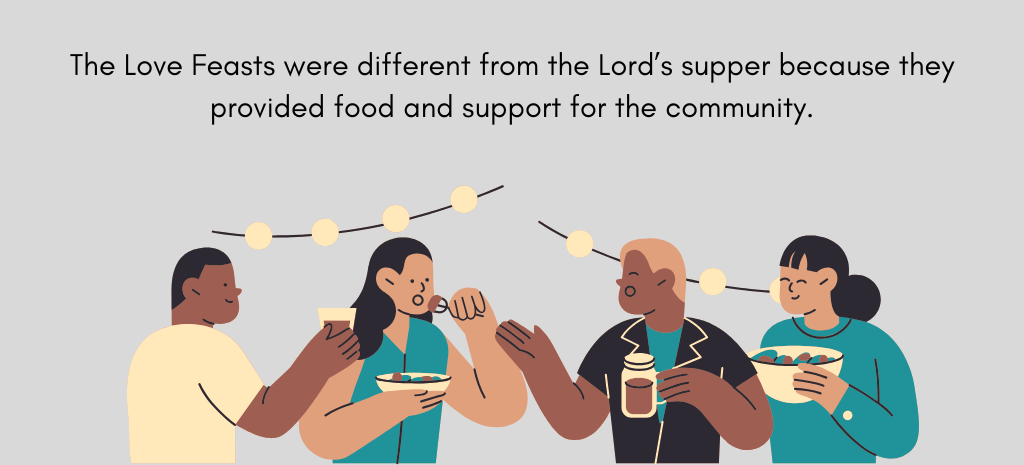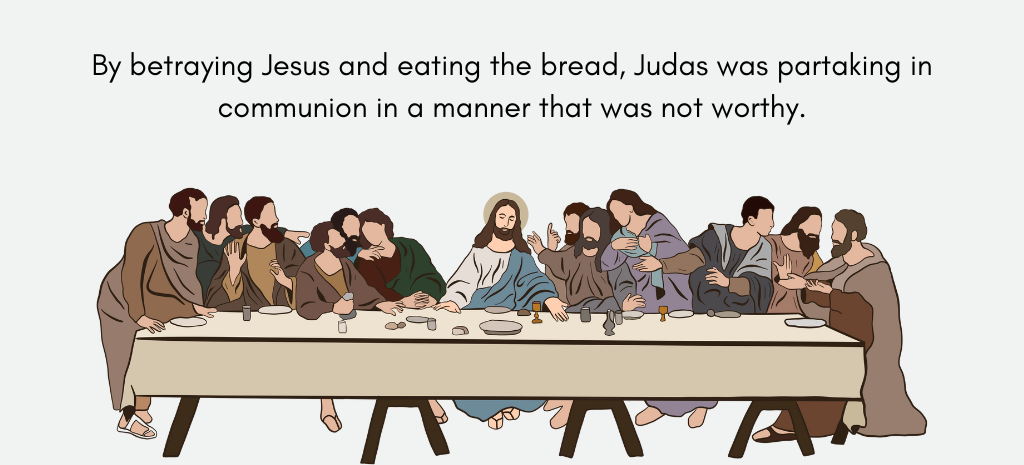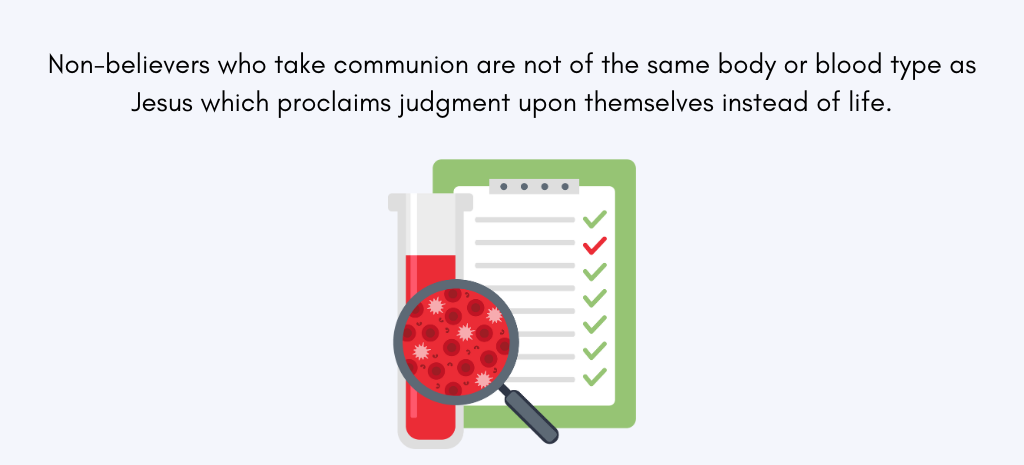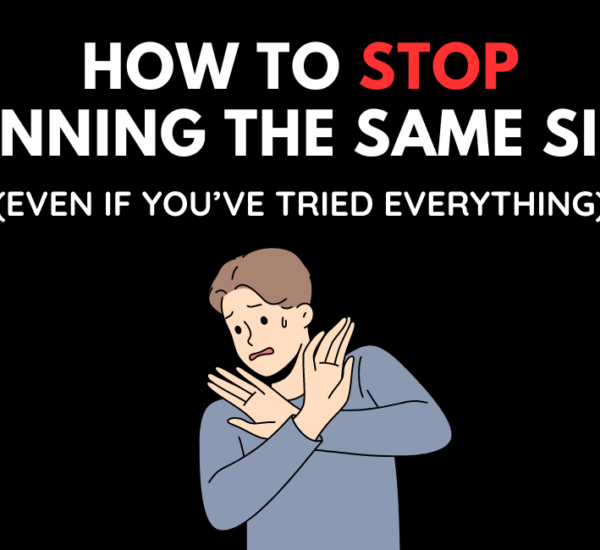
What does it mean to take communion in an unworthy manner and are you risking God’s punishment for taking communion unworthily?
Paul says in 1 Corinthians 11:30 that this is why many of you are weak, sick, and some have even died. He adds that if we judged ourselves rightly, we would not be judged.
If you have ever felt like skipping communion as a believer because you were afraid of God’s judgement or because you felt unworthy to partake because of a sin you committed, then this post is for you.
In this post, I’m going to give you a step-by-step biblical explanation of 1 Corinthians 11 that will clear up some common misunderstandings about the passage.
I will also answer important questions like:
• What does it really means to take communion in an unworthy manner?
• What what are the consequences of partaking in the Lord’s supper without discernment?
• What are you examining yourself for?
• How can you discern the Lord’s body?
Scroll down to read the full post or watch the video below—it’s the same breakdown ⬇️
The Context of 1 Corinthians 11 (Crucial to know)
Before I explain the verse on what does it mean to eat and drink unworthily, it is important to first understand the context of this passage and how Apostle Paul addresses the Church of Corinth.
I also want to mention that when I refer to the Lord’s Supper in this post, I’m also talking about taking communion—and vice versa. I’ll be using these terms interchangeably.
Now Let’s read the passage together.
1 Corinthians 11:17-22 (ESV) says:
“17 But in the following instructions I do not commend you, because when you come together it is not for the better but for the worse. 18 For, in the first place, when you come together as a church, I hear that there are divisions among you. And I believe it in part, 19 for there must be factions among you in order that those who are genuine among you may be recognized. 20 When you come together, it is not the Lord’s supper that you eat. 21 For in eating, each one goes ahead with his own meal. One goes hungry, another gets drunk. 22 What! Do you not have houses to eat and drink in? Or do you despise the church of God and humiliate those who have nothing? What shall I say to you? Shall I commend you in this? No, I will not.”
One of the most important things to understand about this passage is that Paul isn’t just talking about partaking in the Lord’s supper here.
He’s actually referring to something that the church was doing at the time called a love feast, or a charity feast which was different from the Lord’s Supper.
What’s the difference you ask?
The purpose of these love feasts was to provide food and support for the poor in the community while bringing believers together.
It was a form of Christian fellowship with food – kind of like a church potluck.

What often happened within these love feasts is that the believers within a community would gather together for food and fellowship, giving to those who were less fortunate and then afterwards they would gather for the Lord’s supper – or communion.
The Lord’s supper was different from the love feast because it wasn’t just a regular meal that anyone can partake in, but an act of worship for believers to proclaim Jesus’ death, resurrection, and return.
The biggest thing to note here is that Paul is making a clear distinction between the regular meals that happened at the love feast and the bread and wine that was taken during the Lord’s supper afterwards.
He says, “When you come together, it is not the Lord’s supper that you eat.” (1 Corinthians 11:20 ESV).
Now why was it so important for Paul to make a distinction between the two?
The main reason is that he later says that some people were partaking in communion in an unworthy manner, who were failing to discern the body, and were bringing judgment upon themselves—not just any judgment, but judgment guilty of the Lord’s body and blood.

In other words, there were people who were attending the love feast who were partaking in the regular meal who should NOT have been partaking in the Lord’s Supper.
So who are these people within the Church and why are they receiving punishment for taking communion unworthily?
I want you to notice what Paul says about what’s happening within the love feasts:
1 Corinthians 11:18 (ESV) says: “For, in the first place, when you come together as a church, I hear that there are divisions among you. 19 for there must be factions among you in order that those who are genuine among you may be recognized”
and:
Verse 21-22 says: “For in eating, each one goes ahead with his own meal. One goes hungry, another gets drunk. 22 What! Do you not have houses to eat and drink in? Or do you despise the church of God and humiliate those who have nothing?”
In a nutshell, there are people within these church gatherings who are causing division and showing favoritism among the community by excluding others who have nothing from the common meal during the love feast.
And this is where things get really interesting because there is another place in the Bible that talks about a similar group of people within the Church.
Jude’s Letter: Exposing the Ungodly in the Church
Jude chapter 1 is a letter written specifically to Christians, which mentions certain individuals who have crept into the Church unnoticed and who deny Jesus.
These are not just any people; the Bible describes them as shepherds or leaders within the Church.
Jude 1:4 (ESV) says: “For certain people have crept in unnoticed who long ago were designated for this condemnation, ungodly people, who pervert the grace of our God into sensuality and deny our only Master and Lord, Jesus Christ.”
Jude 1:12 (NIV) goes on to say:
“These people are blemishes at your love feasts, eating with you without the slightest qualm—shepherds who feed only themselves.
Jude also describes these people as:
16 These are grumblers, malcontents, following their own sinful desires; they are loud-mouthed boasters, showing favoritism to gain advantage. (Jude 1:16)
and:
“It is these who cause divisions, worldly people, devoid of the Spirit.” (Jude 1:19 ESV)
Does that sound familiar to what we just read in 1 Corinthians?
These “shepherds” crept into the love feasts unnoticed, caused divisions, were showing favoritism, and feeding only themselves.
So how come they were unnoticed?
On the outside, these leaders looked like believers, but on the inside, they were worldly and did not have the Holy Spirit—kind of like Judas.
Although these letters were addressed to the Church, the letter of Jude tells us that not everyone attending these love feasts was a born-again believer.

I believe this is exactly who Paul was warning the Church of Corinth about when he said that many were partaking in communion in an unworthy manner and bringing judgment upon themselves.
People who were NOT born again believers that are taking communion when they should not be.
You might be thinking, “Okay, Val… Well Jude is a different letter, so how can you be sure this is who Paul was referring to in 1 Corinthians?”
The biggest reason isn’t even Jude’s letter itself—it’s actually the context of what Paul says next, right after the passage we just read about divisions in the Church.
After making a distinction from the meals of the love feast, this is the part where Paul explains what communion really is and what happened on the night of the first communion.
The Night of Betrayal and the Bread
1 Corinthians 11:23–26 (ESV) says:
“23 For I received from the Lord what I also delivered to you, that the Lord Jesus on the night when he was betrayed took bread, 24 and when he had given thanks, he broke it, and said, “This is my body, which is for you. Do this in remembrance of me.” 25 In the same way also he took the cup, after supper, saying, “This cup is the new covenant in my blood. Do this, as often as you drink it, in remembrance of me.” 26 For as often as you eat this bread and drink the cup, you proclaim the Lord’s death until he comes.
As Paul begins to talk about communion in verse 23, we enter into another context which describes the night on which Jesus was betrayed.
The night on which Jesus was betrayed was the Last Supper that He shared with His disciples and the same night Judas betrayed Jesus.
This night marked the first communion, or the first Lord’s Supper.
Matthew 26:20-25 (ESV) says:
“When it was evening, he reclined at table with the twelve. 21 And as they were eating, he said, “Truly, I say to you, one of you will betray me.” 22 And they were very sorrowful and began to say to him one after another, “Is it I, Lord?” 23 He answered, “He who has dipped his hand in the dish with me will betray me. 24 The Son of Man goes as it is written of him, but woe to that man by whom the Son of Man is betrayed! It would have been better for that man if he had not been born.” 25 Judas, who would betray him, answered, “Is it I, Rabbi?” He said to him, “You have said so.”
There are a few things I want you to notice about this verse. The first is that when Jesus tells His disciples that one of them will betray Him, all of the disciples—except for Judas—ask Him, “Is it I, Lord?”
This shows that the disciples recognized Jesus as their Lord.
But Judas responded with, “Is it I, Rabbi?” (or teacher), meaning Judas only saw Jesus as a teacher.
The point of this is that Judas was a disciple who wasn’t really a genuine believer.
We know this because Jesus even indicates it when He washes the disciples’ feet in the same room and says, “You are clean, but not every one of you.” (John 13:10 ESV)
The second thing is that Jesus specifically says that the one who betrays him is the one who has dipped his hand in the dish with me.
What was he dipping in the dish?
It was the bread which represented the body of Jesus.

Now this is the part that many people miss.
Unworthy Manner Meaning In The Bible
Remember how 1 Corinthians 11:26 tells us that when someone eats of the bread and drinks of the cup he proclaims the Lord’s death until he comes?
The bread and the wine are a proclamation of the Lord’s death and return.
For a believer, the Lord’s death, resurrection, and return is one of the greatest things we can proclaim.
It is a reminder of what Jesus has done for us that brings great joy and it’s an act of worship unto the Lord.
However…
A proclamation of the Lord’s return isn’t a good thing for everyone.
Specifically those who have not been saved when He returns.
This is primarily because as a non-believer, the return of Jesus means judgement and condemnation for you if you have not put your faith in Him.
So here is Judas, a non-believer and a traitor, partaking in the bread or body of Jesus at the last supper.
Judas was making a proclamation of the Lord’s return while being the same person that was guilty of handing Him over to the authorities for his death.
Which brings us to our main verse:
27 Therefore whoever eats the bread or drinks the cup of the Lord in an unworthy manner, shall be guilty of the body and the blood of the Lord. 28 But a man must examine himself, and in so doing he is to eat of the bread and drink of the cup. (1 Corinthians 11:27-28 ESV)
Verse 27 starts with “therefore,” indicating that when Paul talks about eating the bread or drinking the cup of the Lord in an unworthy manner, he is directly referencing what happened in that room on the night Jesus was betrayed.
Think about this for a moment…
If Communion is a proclamation of the Lord’s death and return, and Judas was the very cause of his death, then Judas was proclaiming judgement upon himself by eating the bread in a manner that was not worthy.
His very unbelief and betrayal of the Lord is what made him unworthy to partake and this is what made him guilty of the body and blood of the Lord.

What Is the Punishment for Taking Communion Unworthily?
As we keep reading this, the next verse says “29 For he who eats and drinks, eats and drinks judgment to himself if he does not judge the body rightly. 30 For this reason many among you are weak and sick, and a number sleep.”
I want you to notice that Paul specifically says that whoever does not judge the body rightly brings judgement upon himself.
The bread in communion represents the body of Christ.
Do you know what happened when Judas partook of the bread during communion?
John 13:27 (NIV) says: “As soon as Judas took the bread, Satan entered into him. So Jesus told him, “What you are about to do, do quickly.”
As soon as Judas partook of the bread, there was an immediate judgment that happened where Satan entered into him, ultimately leading to his own death.
Now let’s dive into these passages a bit more because there’s a lot of gold here.
Paul says in verse 28 that “a man must examine himself and in so doing he is to eat of the bread and drink of the cup.”
So the question is what are we examining ourselves for?
What ‘Let a Man Examine Himself’ Really Means
Paul tells us that a man must examine himself, not what he’s doing or what he’s done.
Some people will say that taking communion unworthily is when someone does communion the wrong way or that they’ve recently fallen into sin which has made them unworthy to partake.
And remember, not just unworthy, but guilty of the body and blood of the Lord.
So to answer this you have to ask yourself a few questions:
What makes you worthy to partake in communion in the first place? Is it the works you’ve done or because you’ve confessed your sins? Or maybe it’s because you’ve been sin free for the last week?
The truth is that the only one who is worthy is Jesus Christ.
However, the good news is that when you receive Jesus into your life, you become one with Him, and God considers you worthy because of who He is inside of you—not by anything you’ve done.
The only thing that makes you worthy to partake in communion is your faith in Jesus.
The other part of this is that when you received Jesus Christ into your life, it was the blood of Jesus that washed away all your sins and it was His broken body that made a way for you to enter into God’s presence freely.
Hebrews 10:19-20 (ESV) says:
“19 Therefore, brothers, since we have confidence to enter the holy places by the blood of Jesus, 20 by the new and living way that he opened for us through the curtain, that is, through his flesh”
In essence, the very thing you are partaking in during communion—the bread, which represents the body, and the wine, which represents the blood—is a reminder of what made you worthy to partake in the first place as a believer.
So, going back to our question—what are we examining ourselves for?
There’s another passage in 2 Corinthians 13:5 where Paul tells the church in Corinth to examine themselves again and this time he tells them what they should be examining themselves for.
2 Corinthians 13:5 says “Examine yourselves, to see whether you are in the faith. Test yourselves. Or do you not realize this about yourselves, that Jesus Christ is in you?—unless indeed you fail to meet the test!”
I believe Paul is telling the Church of Corinth in first Corinthians to also examine themselves to see whether they are truly born-again believers before partaking in communion because not everyone in the church was of the faith.
Just as Judas was among the disciples as an unbeliever, and just like the letter of Jude which describes people within the love feasts who had denied Jesus, so it was in this situation.
We aren’t examining ourselves for the sins we’ve committed or if we’re doing communion the wrong way.
We are examining ourselves to see whether we are in Christ when partaking in communion.

I have personally witnessed many born-again Christians, who are living for Jesus, refuse to partake in communion because they feel condemned and unworthy due to a sin they committed or a thought they had before communion.
To some it may not seem like a big deal, but the reality is that by not taking communion as a believer you are missing out on the opportunity to worship the Lord for what He’s done for you and receive the blessing that comes with partaking in it.
Paul tells us that after examining yourself, THEN you are to eat of the bread and drink of the cup.
That’s because it’s a very simple examination.
Before taking communion, examine yourself by asking:
Am I a believer in Christ and have I been born again?
Hmm. Yes.
Okay then partake of the bread and drink of the cup that represents your forgiveness of sins through the blood of Jesus and your healing through His broken body.
Can it really be that simple?
Yes, and I’ll show you why this is so.
The Meaning of Judging Yourself and The Body Rightly
Paul goes on to say that “if we judged ourselves truly, we would not be judged” and “when we are judged by the Lord, we are disciplined so that we may not be condemned along with the world.” (1 Corinthians 11:31-32 ESV)
Wait a minute…
Jesus said in John 3:18 – “He who believes in Him is not judged; he who does not believe has been judged already…”
And Romans 8:1 (NIV) says: “Therefore, there is now no condemnation for those who are in Christ Jesus”
So who is it that is being judged and disciplined so that they are not condemned along with the world?
Those in the midst of the church who think they are a part of the body, but have not been born again and are actually still a part of the world.
You see, Judging the body rightly is a matter of discerning whether or not you belong to the body.
And as someone who isn’t born again, you are partaking in something that is Holy that you are not really a part of.
Since Apostle Paul talks about the blood and body of Jesus, I think there’s a really good hidden metaphor here that my friend Roman brought up when we talked about this.
Partaking in communion is kind of like a blood transfusion where someone receives blood from another person, called a donor, usually because they’ve lost a lot of blood and need more blood to stay healthy.
When we partake of the wine or grape juice in communion as believers, symbolically speaking we are receiving the blood of Jesus which brings healing, forgiveness, and restoration into our lives because we are one body with Christ.
However, if a donor’s blood in a transfusion does not match the recipient’s blood type, the body sees it as foreign and attacks it, causing what’s called a hemolytic reaction where the body destroys the transfused blood cells.
This can lead to symptoms like fever, chills, organ failure, and even death if not treated—kinda like what Paul is saying about people in the church of Corinth becoming weak, sick, and even dying.
In a similar way, non-believers who take communion are not of the same body or blood type as Jesus which proclaims judgment upon themselves instead of life.

Now I don’t say this as a way to condemn non-believers who have partaken in communion before.
God is so gracious and merciful that even in our mistakes, He corrects us so that we can partake in the good things that He has in store for us.
You have the opportunity to be able to partake in communion in a worthy manner at any time simply by asking Jesus to come into your life and transform you.
He wants you to be able to know Him personally and to sit at his table, but you have to be willing to let Him in your heart.
On a final note, Apostle Paul ends off this part of his letter by saying:
“So then, my brothers, when you come together to eat, wait for one another— 34 if anyone is hungry, let him eat at home—so that when you come together it will not be for judgment. (1 Corinthians 11:33-34 (ESV)
Towards the end here, we got back to our original context of what is happening in the Church of Corinth.
Since their were people who were being excluded from the common meal, while others ate by themselves and got drunk off the wine, Paul offers a solution to the church:
They should wait for each other to eat the normal meal, and those who are hungry should eat at home, so that no one partakes in communion simply because they are hungry.
Ultimately, this helps avoid gathering for judgment by preventing non-believers, who might still be hungry after the love feast, from taking Communion just because there is more bread and wine available.
In Conclusion
Taking communion in an unworthy manner was a direct reference to Judas when he partook of the bread in the night which he betrayed Jesus, and the moment he did a judgement occurred where satan entered into him.
Paul is telling the Church of Corinth to examine themselves to see whether they are truly born again believers before partaking in communion and to abstain from taking in communion if they are not a part of the body of Christ so they don’t bring judgement upon themselves.
As born again believers, we should always partake in communion regardless of how we feel or what we’ve done, short of renouncing the Lord because it’s the body and blood of Jesus that makes us whole.


Great teaching!